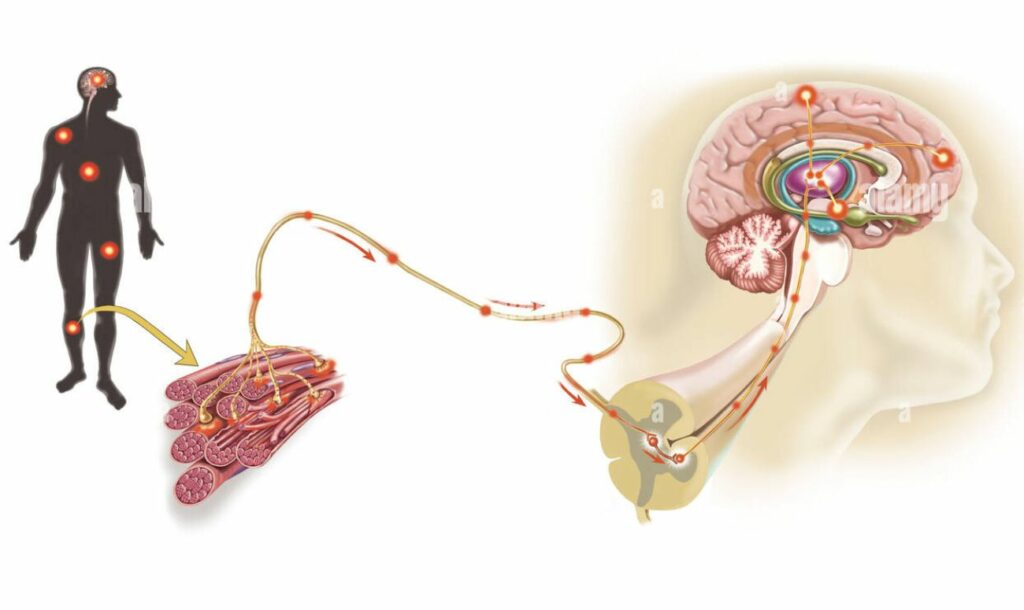Managing Chronic Pain with Integrated Mental Health Approaches
An integrated approach to managing chronic pain considers both the physical and mental aspects of care. By combining treatments for the body and mind, healthcare providers can help individuals achieve a more balanced and sustainable form of relief. This integrative strategy includes a range of therapies, from medication to cognitive-behavioral approaches, that collectively address the complexities of chronic pain and mental health.
Therapies for Chronic Pain Management: Cognitive Behavioral Therapy (CBT) and Beyond
Cognitive Behavioral Therapy (CBT) is one of the most effective therapies for addressing chronic pain’s impact on mental health. CBT helps patients reshape negative thought patterns associated with pain and develop resilience. Additional therapies, such as Acceptance and Commitment Therapy (ACT) and Pain Reprocessing Therapy, also aid in managing both the physical and mental aspects of chronic pain.
Mindfulness, Meditation, and Relaxation Techniques for Pain Relief
Mindfulness practices, meditation, and relaxation techniques offer additional relief. These strategies enable patients to manage their pain response more effectively and reduce feelings of stress or anxiety associated with chronic pain. Evidence-based relaxation methods like deep breathing and progressive muscle relaxation improve overall quality of life, helping individuals cope better day-to-day.
The Power of Support Systems in Managing Chronic Pain
Support systems play a vital role in coping with chronic pain. A network of family, friends, and peers offers emotional support, practical assistance, and companionship. For those without close connections, support groups and online communities offer an alternative, providing a space to share experiences and find comfort among others who understand their journey.
Effective Communication with Healthcare Providers About Pain and Mental Health
Open and honest communication with healthcare providers is crucial for effective pain and mental health management. Individuals with chronic pain are encouraged to advocate for their needs and ask key questions regarding treatment options. Establishing a collaborative relationship with healthcare professionals can lead to better outcomes and improved understanding of one’s condition.
Lifestyle Modifications for Better Pain and Mental Health Outcomes
Lifestyle changes are essential for managing chronic pain and supporting mental well-being. Dietary adjustments, such as reducing processed foods and consuming anti-inflammatory foods, can help manage pain levels and mood. Tailored exercise routines can improve physical resilience, reduce pain, and boost endorphins, contributing to a more balanced mental state.
Seeking Professional Help: Recognizing When It’s Time
Knowing when to seek professional help is key for those managing chronic pain. Persistent emotional decline, lack of motivation, and heightened pain sensitivity may signal that it’s time to consult a mental health professional. Mental health screenings can aid in identifying underlying issues, providing opportunities for early intervention.
Exploring Treatment Options for Chronic Pain and Mental Health Together
Combining treatments such as medication, therapy, and lifestyle adjustments offers a comprehensive approach to managing both pain and mental health. Advances in medical and psychological treatments now offer new pathways for individuals to find effective solutions, ensuring that they receive holistic and long-term support.
The Importance of Mental Health Screenings in Chronic Pain Management
Mental health screenings are beneficial in chronic pain management, as they help identify underlying mental health conditions that may be otherwise overlooked. By integrating screenings into pain management clinics, healthcare providers can ensure that mental health issues are addressed early on, enhancing overall treatment efficacy.
Recognizing Early Signs of Mental Health Decline in Chronic Pain Patients
Chronic pain can lead to subtle signs of mental health decline, such as irritability, changes in appetite, and mood fluctuations. Recognizing these indicators early allows individuals to seek help before symptoms escalate, potentially preventing further emotional distress.
Taking Action: The Benefits of Seeking Help for Chronic Pain and Mental Health
Seeking help early on improves long-term outcomes for both chronic pain and mental health. Effective pain management and mental health support can lead to improved quality of life, greater functionality, and a more positive outlook, empowering individuals to manage their conditions actively.
FAQs: Managing Chronic Pain and Mental Health Together
Addressing common questions regarding the relationship between chronic pain and mental health can provide clarity and guidance, offering practical advice on managing pain, seeking mental health support, and enhancing overall quality of life.
Why does chronic pain often lead to mental health issues?
Chronic pain can be exhausting and isolating, leading to frustration, anxiety, and feelings of helplessness. Over time, these feelings may compound, impacting mental health. Additionally, chronic pain can alter brain chemistry, making individuals more susceptible to mood disorders.
- What mental health conditions are commonly associated with chronic pain?
Depression, anxiety, and mood disorders frequently co-occur with chronic pain. The constant strain of dealing with pain can increase the risk of developing these mental health conditions, which often intensify the perception of pain, creating a cycle that’s difficult to break.
- Is it possible to manage both chronic pain and mental health simultaneously?
Yes, many integrative approaches address both chronic pain and mental health. Treatments such as Cognitive Behavioral Therapy (CBT), mindfulness practices, and medication, alongside lifestyle adjustments, can help individuals manage both physical and emotional symptoms effectively. For those seeking expert support, the Best Therapists in New Jersey can provide valuable guidance and care tailored to both pain management and mental health improvement, offering holistic solutions that address the mind and body.
- How can I communicate my mental health concerns to my healthcare provider if I have chronic pain?
Being open with your healthcare provider is essential. Express both your pain levels and emotional symptoms, and don’t hesitate to ask about treatments that can address both issues. Having a support system and preparing a list of concerns before appointments can also make discussions more productive.
Outcome
The journey through chronic pain can be challenging, but understanding its broader impacts on mental health is a critical step. Holistic, integrative approaches help individuals reclaim control and foster resilience, emphasizing that chronic pain, while difficult, does not have to define one’s mental well-being.



